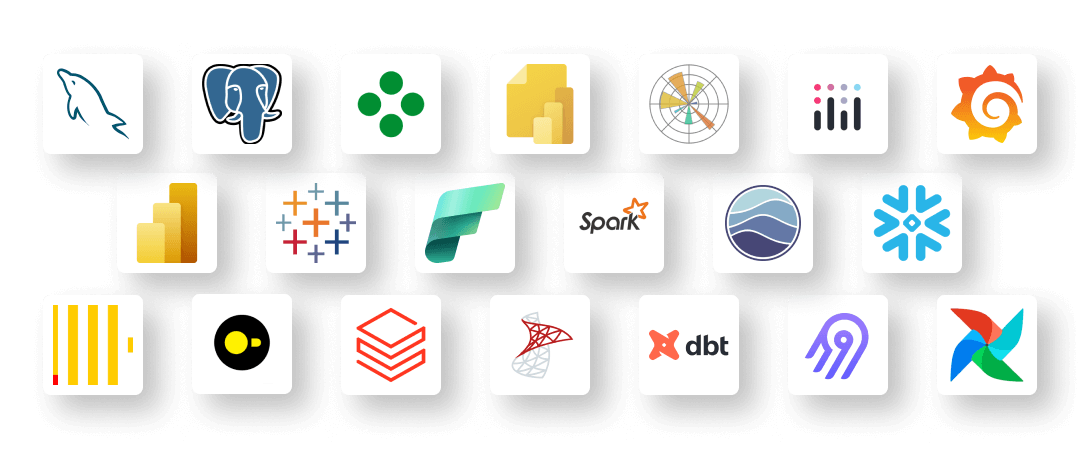Data Engineering
In today’s data-driven economy, where data is considered the new gold, data engineering is the keystone for companies looking to maximize the value of their data and unlock and harness this precious commodity.
Data engineering involves the development, implementation and maintenance of systems that transform raw data into valuable, consistent information that can be used for analytics, business insights and machine learning.
Our data engineering service not only provides the foundation for accurate data analysis, but also enables companies to operate more efficiently, make informed decisions and develop innovative solutions. We ensure that your data is not only accessible, but also meaningful and actionable to drive your business forward in the digital era.
Our services Detail
Data architecture and infrastructure
Our approach to data architecture and infrastructure enables the development of powerful and scalable data platforms that are precisely tailored to your company’s requirements. We work with both open source technologies and proprietary software solutions and adapt our approach flexibly to your individual needs. Our data architectures are secure, future-proof and optimized for the efficient processing, analysis and use of large volumes of data – whether for real-time analyses or data-driven decision-making processes.
Data preparation and integration
In data preparation and integration, we rely on both open source technologies and proprietary software solutions to enable efficient and comprehensive data processing. Our approach enables the extraction, transformation and loading (ETL) of data from a wide variety of sources, while ensuring the highest standards of data quality and integrity. We also enable structured and automated management of complex data models, creating a consistent and reliable data basis for analyses and business decisions.
Automation and data flows
For the automation of data flows, we develop powerful data pipelines that support both real-time and batch processing. By using flexible integration and transformation solutions, we enable the seamless connection and synchronization of a wide variety of data sources. This ensures that data is processed efficiently and provided in the correct structure. This allows companies to react more quickly to changes, gain deeper insights and make well-founded, data-driven decisions.
Why moove with us?
Broad technology know-how
Our customers are individual. That’s why we also act flexibly with a wide range of technologies, from open source to proprietary software, to find the optimum solution for your problem.
Agility and customer focus
We emphasize close collaboration and agile processes to deliver solutions that create real business value and fit seamlessly into your existing processes.
Focus on data quality
With detailed data integrity checks and state-of-the-art standardization processes, we ensure the quality and reliability of your data to support well-founded decisions.
Future-proof solutions
Our data architectures are designed to grow with your business and provide a long-term platform for your data-driven ambitions.
Choose us for a partnership based on trust, expertise and a deep commitment to your success

FAQ
Was ist Data Engineering?
Data engineering is the process of developing, implementing and maintaining systems that convert raw data into high-quality, consistent information. This serves as the basis for analyses and machine learning. Data engineering is the foundation that makes BI and data analytics possible. It deals with the development and maintenance of systems and architectures required for the collection, storage and processing of data. Data engineers focus on creating and optimizing data pipelines to aggregate, cleanse and deliver data from various sources in a format suitable for analysis.
Was sind die Vorteile eines Data Engineering Service?
A professional data engineering service not only improves data quality and standardization, but also enables your company to use data-driven solutions more effectively. This leads to better decisions based on the insights gained, increased product quality and user experience through data analysis, the identification of new business opportunities through behavioral predictions and a reduction in costs and an increase in profits by simplifying the data architecture. In addition, the duration of projects can be reduced through faster access to insights.
Wann benötigt ein Unternehmen einen Data Engineering Service?
A company needs a data engineering service when it is faced with growing volumes of data that need to be efficiently collected, stored, processed and analyzed to gain valuable business insights. When internal resources are insufficient to handle these tasks or specialized expertise is required to build and maintain complex data infrastructures, it’s time to call in a professional service. This is also the case if the company wants to make data-driven decisions in order to increase its competitiveness or develop new business models and opportunities.
Wie kann Data Engineering meinem Unternehmen helfen?
Data engineering can help your business in many ways by building a robust data infrastructure that enables data to be collected, stored, processed and analyzed efficiently. This supports better, data-driven decision making, optimizes business processes through automation and increased efficiency, and drives innovation by unlocking new data sources and analytics methods. It also helps to improve customer relationships through personalized offers and services and strengthen market position through faster response to market changes and informed strategy development. In short, data engineering enables your company to fully exploit the value of your data and achieve a sustainable competitive advantage.
Wie unterscheidet sich Data Engineering von Data Science?
Data engineering focuses on the infrastructure and architecture for data, including its collection, storage and provision. Data science, on the other hand, uses this data to recognize patterns, make predictions and gain insights through statistical models and algorithms.
Welche Elemente gehören zu einem Data Engineering-Projekt?
There are several key elements to a data engineering project, including data acquisition and collection, where data is gathered from various internal and external sources. Data storage and organization, including the creation of databases, data warehouses and data lakes, is another key aspect. Data processing and transformation to bring raw data into a form suitable for analysis is also part of this, as is data integration to bring together data from different sources and create a unified view. The automation of data flows and the assurance of data quality and integrity through appropriate controls are also important components. Last but not least, data accessibility and provision play a role in ensuring that end users can easily access and use the data.
Wie lange dauert die Implementierung eines Data Engineering-Projekts?
The duration depends on the complexity of the data landscape, the specific requirements and the scope of the project. Smaller projects can be completed within a few weeks, while more extensive projects can take several months.
Welche Technologien nutzen Sie in Ihren Data Engineering-Projekten?
We rely on a variety of technologies, including Power BI, Apache Spark, Snowflake, SSIS, Databricks, PostgreSQL, Airflow and Airbyte, to name a few. Our selection is based on the specific requirements of the project and the best tools for the job.
Wie stellen Sie die Qualität und Integrität der Daten sicher?
Through the use of rigorous data quality checks, anomaly detection and standardization procedures, we ensure the accuracy, reliability and consistency of the data. We also implement best practices for data modeling to preserve the integrity of the data.
Wie können Ihre Services meinem Unternehmen helfen, datengetriebener zu werden?
Our services enable your company to build a solid data infrastructure, efficiently integrate and process data from various sources and gain deep insights into your business processes. This enables you to make more informed decisions, increase efficiency and identify new business opportunities.





